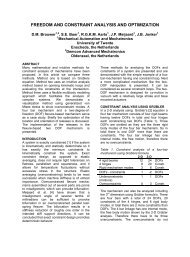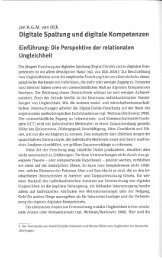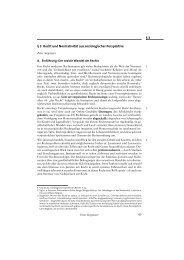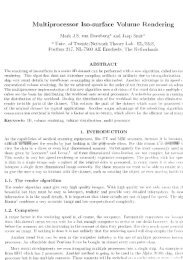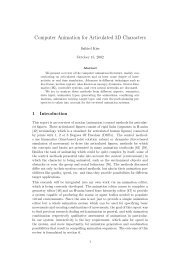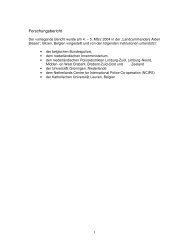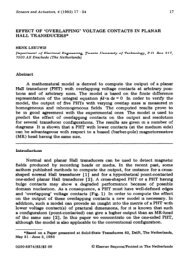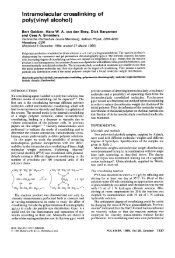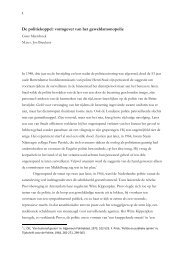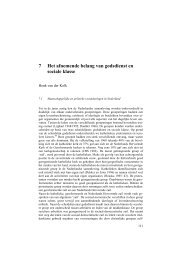Innovation and institutional change: the transition to a sustainable ...
Innovation and institutional change: the transition to a sustainable ...
Innovation and institutional change: the transition to a sustainable ...
Create successful ePaper yourself
Turn your PDF publications into a flip-book with our unique Google optimized e-Paper software.
228 Chapter 8<br />
ideas. Moreover, <strong>the</strong> strong focus on incumbent companies should be<br />
assessed critically as many have pointed out how difficult it is for<br />
incumbents <strong>to</strong> deliver more radical innovations (Henderson <strong>and</strong> Clark, 1990;<br />
Utterback, 1994; Christensen, 1997). Especially new start-ups, small firms,<br />
<strong>and</strong> outsiders are found <strong>to</strong> play a pivotal role in studies of radical innovation<br />
<strong>and</strong> systems <strong>change</strong> (Van de Poel, 1998, 2000; Geels, 2002). Incumbents are<br />
sometimes able <strong>to</strong> provide new products <strong>and</strong> markets, but evidence shows<br />
that it is often small, creative, new entities <strong>and</strong> networks developing new<br />
practices that provide <strong>the</strong> seeds for new sociotechnical systems. These<br />
insights have led <strong>to</strong> a whole body of research focussing on specific<br />
management approaches <strong>to</strong> radical innovation because established<br />
management approaches for regular innovations (‘evaluation routines’) may<br />
even be detrimental <strong>to</strong> radical innovations (Christensen, 1997; McDermott<br />
<strong>and</strong> O’Connor, 2002; Jolivet et al, 2002).<br />
Suggestion 1: Broaden networks <strong>and</strong> perspectives<br />
The cases of green electricity <strong>and</strong> decentral cogeneration illustrated that<br />
alternative organisational forms, new networks, <strong>and</strong> alternative <strong>institutional</strong><br />
arrangements can be crucial in advancing alternative practices. The inclusion<br />
of incumbent energy companies in those <strong>change</strong> processes could take place<br />
as <strong>the</strong>ir frames of reference <strong>and</strong> perceptions of <strong>the</strong> nature of problems <strong>and</strong><br />
solutions shifted. We do <strong>the</strong>refore not suggest that <strong>the</strong> involved ac<strong>to</strong>rs <strong>and</strong><br />
proposed paths do not hold promise, but we argue for <strong>the</strong> value of involving<br />
o<strong>the</strong>r ac<strong>to</strong>rs <strong>and</strong> networks exhibiting less lock-in <strong>to</strong> existing energy paths <strong>and</strong><br />
its <strong>institutional</strong> logics.<br />
To also adopt a constructive stance <strong>the</strong>refore two suggestions are made. One<br />
proposal is <strong>to</strong> develop a <strong>transition</strong> route around ac<strong>to</strong>rs <strong>and</strong> networks with<br />
initial exclusion of incumbents. A possibility is <strong>to</strong> focus on ways <strong>to</strong><br />
integrated developments in information <strong>and</strong> communication technologies<br />
(ICT) with alternative energy systems. ICT plays a role in alternative<br />
metering <strong>and</strong> control systems for energy users, <strong>and</strong> on <strong>the</strong> o<strong>the</strong>r h<strong>and</strong> <strong>the</strong><br />
expansion of ICT companies, networks <strong>and</strong> use also dem<strong>and</strong>s new forms<br />
(quality) of energy provision. Ano<strong>the</strong>r proposal is <strong>the</strong> development of a<br />
<strong>transition</strong> route from <strong>the</strong> user perspective. In <strong>the</strong> relative successful cases of<br />
green electricity <strong>and</strong> decentral cogeneration <strong>the</strong> role of users <strong>and</strong> a strong<br />
dem<strong>and</strong> orientation played an important role. The relevance lies also in <strong>the</strong><br />
nature of <strong>the</strong> dynamics involved in such a user oriented approach which can<br />
initiate a ra<strong>the</strong>r rapid take-off once an effective new practice, broad patterns<br />
of mobilisation, <strong>and</strong> catching <strong>institutional</strong> logics have materialised.



